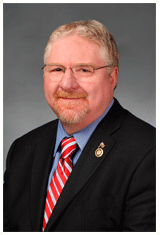| Legislative Column for the Week of April 13, 2015 |
Missouri Senate Approves Major Education Bill |
|
This week, the Senate approved House Bill 42, which is now the Legislature’s vehicle for this year’s major education effort to fix Missouri’s flawed student transfer law and address a number of other important education issues, including the foundation formula and our formula school districts. The Senate’s education bill, Senate Bill 1, stalled due to an estimated $200 million price tag; the House’s measure has a much more conservative fiscal note of approximately $23 million.
In a February column, entitled “When it Comes to Education, One Size Does Not Fit All,” I described how there are significant differences between the needs and characteristics of a rural school versus an urban school, and the profound frustration I feel when rural schools in small communities are consistently forced to take a back seat to the problems of urban schools in big cities. I’m not insensitive to the very real issues affecting some of our school districts, and I welcome any fair and practical legislative solution to alleviate the problems they’re facing. All of Missouri’s children should have a quality education and the opportunity to be successful.
What I will not do, however, is sit back and watch our schools in rural communities be harmed at the expense of their urban counterparts. A prime example of this is legislation passed last year, which provides funding for early childhood education in unaccredited or provisionally accredited school districts (many of which are in urban areas). To pay for those programs, a change was made in the way school funds are distributed—a change that disproportionately affects rural school districts that do not have the large local tax bases urban school districts enjoy. Urban districts get more, while rural districts get less. This is unacceptable. The wants and needs of students in Kansas City or St. Louis are no more or less important than those in Nixa or Republic.
This is why, on Monday (4-13), I offered an amendment to HB 42 that addresses two of my chief concerns affecting education funding—particularly funding for our formula schools, which are found in so many of Missouri’s rural areas. To quickly recap, funding for a formula school district is tied to the funding level of the foundation formula, meaning it can fluctuate year-to-year depending on how the General Assembly appropriates funds; meanwhile, a “hold harmless” school district cannot receive less formula revenue than it received for the 2005-2006 school year, the last year of the old formula.
The amendment I offered has two parts. The first part addresses the way funding for our foundation formula is calculated. One of the factors used in the calculation is called the State Adequacy Target. In very simplistic terms, the SAT helps the state educate students adequately by funding Missouri’s districts equitably.
A problem we’ve seen in recent years is that a very small number of extremely fast-growing schools, approximately 10 schools, are artificially driving up the SAT, making it virtually impossible to fully fund the formula. Without a fully funded foundation formula, our formula schools will never receive the funding they need to give their students the best possible education. My amendment would essentially leave out these fast-growing schools, thereby preventing the formula from being skewed, allowing it to grow at a much slower rate and making possible the currently impossible task of fully funding it.
The second part provides for a one-year grace period where, if we don’t hit the necessary number to fund both formula and hold harmless districts, neither side would receive less money than they did for the current fiscal year. While we have hit the necessary funding level for Fiscal Year 2016, there is always the possibility of the governor withholding funding. There’s just no way of telling what could happen in the future. This portion of the amendment acts as an insurance policy to guarantee our formula school districts do not suffer if the formula isn’t fully funded.
I’m pleased to say both of the provisions in my amendment were adopted by my colleagues. House Bill 42 will now make its way to a conference committee, where members from both the Senate and House will work together to compromise on the measure’s key provisions.
If you have any questions or comments about this or any other matter regarding your state government, please feel free to contact me at (573) 751-1503; you are also welcome to e-mail me at jay.wasson@senate.mo.gov.
|



